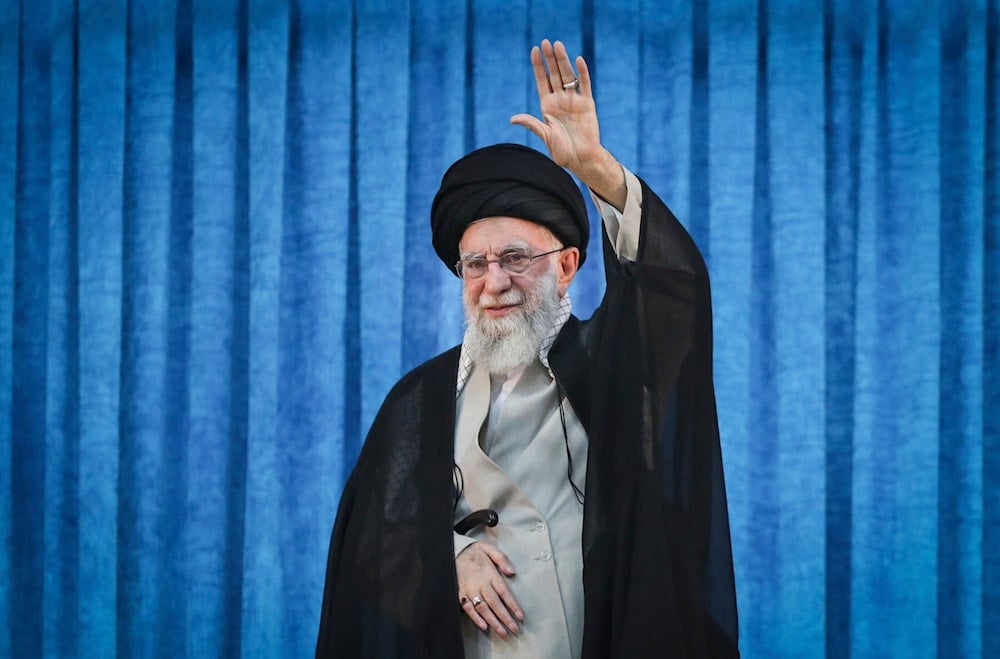Iran's Sunnis, religious minorities, rally around Sayyed Khamenei
Iranian Sunni, Christian, Jewish, Zoroastrian, and Mandaean leaders condemn US and Israeli threats against Sayyed Khamenei, warning of international law violations and global repercussions.
-

Iran's Leader Sayyed Ali Khamenei waves as he arrives for a ceremony marking the anniversary of the death of the late leader Sayyed Ruhollah Khomeini at his shrine just outside Tehran, Iran, Wednesday, June 4, 2025 (AP)
Iran’s religious leaders, Sunni, Christian, Jewish, Zoroastrian, and Mandaean, have united to condemn US and Israeli threats against Sayyed Ali Khamenei on Saturday, warning of global repercussions and asserting self-defense rights under international law.
Prominent leaders from Iran’s Christian, Jewish, Zoroastrian, and Mandaean communities signed a statement condemning the threats by US President Donald Trump and Israeli Prime Minister Benjamin Netanyahu, declaring them an attack not only on a political figure but on the shared values and spiritual dignity of believers worldwide.
"Divine leaders and religious scholars are the perfect mirror of the identity of the followers of divine religions... attacking them is considered an attack on the beliefs and emotions of hundreds of millions of people,” the statement said. The clerics warned that "Israel's" and the United States' threats violate the United Nations Charter and International laws, particularly those protecting high-ranking officials of UN member states.
The faith leaders underscored that such threats, if deemed imminent, would justify legitimate preemptive self-defense under international law, warning that these provocations risk triggering uncontrollable regional and global repercussions given the issue’s transcendent religious significance.
“The world's religious and interfaith leaders, the United Nations Security Council, and other international institutions and legal authorities are expected to respond decisively, publicly, and effectively,” the statement asserted.
Sunni leaders in Iran denounce threats to Iran's leader
The Sunni leadership in Iran emphasized that the Israeli regime and its supporters "will not escape the grasp of Iran's armed forces," calling on the people of Iran to maintain unity and solidarity while remaining vigilant against "traitors."
In a statement, the leadership of the Sunni communities in Iran strongly condemned Trump’s remarks regarding the Leader of the Revolution and the Islamic Republic, Sayyed Ali Khamenei. They warned that any attempt to attack him "will be met with a fierce and devastating response from the Iranian people, all believers, and freedom-seeking people across the world."
The statement from the leaders of the Sunni communities came after US President Donald Trump said on Tuesday, "We know where Iran’s Supreme Leader is, but we won’t strike him for now, we demand unconditional surrender."
This was alongside Israeli Prime Minister Benjamin Netanyahu’s remarks that he "does not rule out the possibility of assassinating Iran’s Supreme Leader," as well as the comments by "Israel’s" Security Minister Israel Katz, who declared that Sayyed Khamenei "can no longer be allowed to exist."
Khamenei warns of dire consequences if US joins the war
The Leader of the Islamic Revolution and the Islamic Republic of Iran, Sayyed Ali Khamenei, delivered a stark warning to the United States against military intervention in support of "Israel’s" war on Iran, stating that such a move would "result in consequences they could never repair", during a speech on June 18.
"The Americans should know that any military intervention will have irreparable consequences for them," Sayyed Ali Khamenei said, emphasizing that "the US knows that intervention in Israeli aggression on Iran will leave them damaged far more than they could do to Iran."
The Leader characterized American military participation as undeniable proof of the Zionist regime's fundamental vulnerabilities, asserting that Washington's decision to join the offensive alongside the occupation forces exposes the inherent fragility of the Israeli entity's strategic position.

 4 Min Read
4 Min Read










